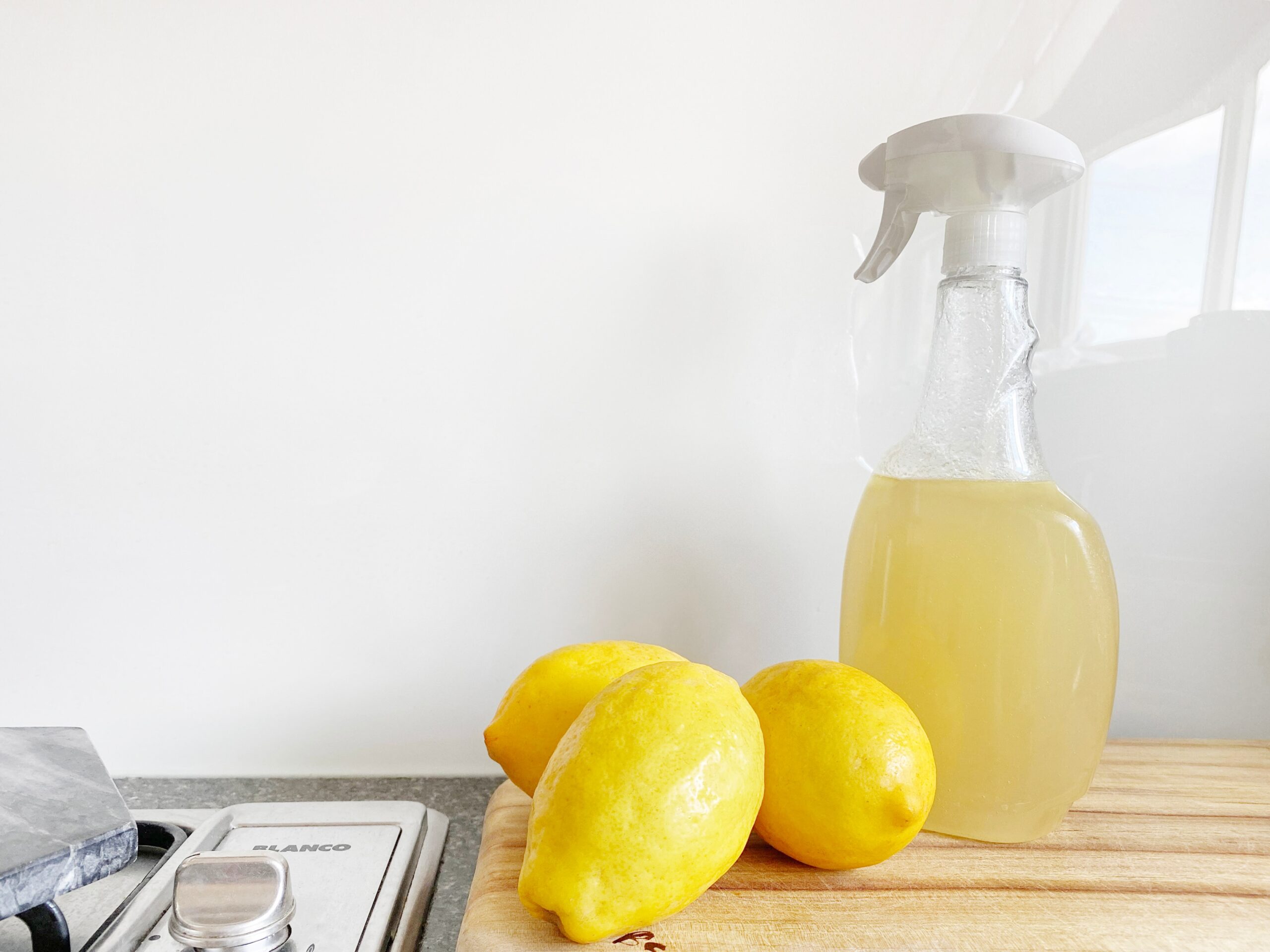Do you ever feel like there are too many cleaning products available? Do you worry about their impact on your health and the environment?
If so, you’re not alone.
Fortunately, with these simple recipes, you can create effective and natural cleaning solutions for a variety of surfaces in your home, with ingredients that you probably already have at home..
And the best part is, many of these ingredients can often be found in bulk at stores, making them both affordable and eco-friendly!

All-Purpose Cleaner:
Mix equal parts of water and vinegar in a spray bottle. Add a few drops of essential oil (optional). Shake well before use. This is a versatile cleaner for many tile floors, countertops, glass windows, and stainless steel. (See the section on vinegar below!)
All-Purpose Cleaner for acid-sensitive surfaces:
This is for materials such has marble, granite, and other natural stone, or anything sensitive to the acidity of vinegar. A couple of cups of water with a teaspoon of castile soap. Shake well before use. This solution can be used on most surfaces such as countertops, floors, and walls.
Toilet Bowl Cleaner:
Mix 1/4 cup of baking soda with 1 cup of vinegar. Pour the mixture into the toilet bowl and let sit for 10-15 minutes. Scrub with a toilet brush and flush.
Oven Cleaner:
Mix baking soda and water to form a paste. Apply the paste to the inside of the oven and let sit for at least 15 minutes. Use a scrub brush or sponge to remove the paste and any grime.
Furniture Polish:
Mix 1/4 cup of vinegar with 1/4 cup of olive oil. Add a few drops of lemon essential oil for fragrance. Shake well and apply a small amount to a soft cloth. Rub onto wooden furniture in a circular motion.

Here are some additional Do’s and Don’ts to keep in mind when using natural materials to make your own cleaning solutions.
Do’s:
- Do label your homemade cleaning solutions and keep them out of reach of children and pets.
- Do use hot water when making cleaning solutions to help dissolve ingredients.
- Do always test your homemade cleaning solution on a small, inconspicuous area before using it on a larger surface.
Don’ts:
- Don’t use natural materials that can damage certain surfaces. For example, baking soda can be abrasive and can scratch delicate surfaces.
- Don’t use essential oils in excess (just 2-5 drops) as they can be irritating to the skin or cause allergic reactions.
- Don’t store your homemade cleaning solutions for too long. They can lose their effectiveness over time or even become moldy.

Vinegar is an effective and affordable ingredient in natural cleaning solutions.
Its acidity makes it an effective ingredient for removing stains and odors. Adding essential oils to vinegar-based cleaning solutions can enhance their cleaning power and provide a welcome scent.
I just cleaned my whole bathroom today with a water, vinegar, and essential oils solution and it looks and smells fantastic!
Here are some do’s and don’ts to follow when using vinegar.
Do’s:
- Do use vinegar to clean surfaces that are not sensitive to acid, such as certain tile floors, countertops, and glass.
- Do dilute vinegar with water before using it as a cleaning solution. For general cleaning purposes on surfaces not sensitive to acid, a safe ratio to start with is one part vinegar to one part water. Some people use less vinegar, closer to 3 parts water with 1 part vinegar.
- Do use vinegar to remove hard water stains, soap scum, and mildew.
Don’ts:
- Don’t mix vinegar (an acid) and castile soap (a base) together, as they can cancel each other out.
- Don’t mix bleach with vinegar or any other acid-based cleaning solution. This can create toxic fumes.
- Don’t use vinegar as a disinfectant for surfaces that have come into contact with raw meat or other potentially harmful substances. Vinegar is not effective against all types of bacteria and viruses.
Vinegar is not to be used on:
- Natural stone surfaces such as marble or granite, as the acid can etch the surface.
- Electronic devices or appliances, as the acid can damage them.
- Hardwood floors or furniture, as the acid can strip the finish and cause damage.
- Rubber parts, such as on appliances, that can be corroded by it.
- Aluminum or cast iron cookware, as the acid can corrode the surface.
By following these do’s and don’ts, you can create effective and safe cleaning solutions using natural materials for your home.
In conclusion, making your own cleaning solutions using natural ingredients is not only eco-friendly, but it can also save you money and reduce your exposure to potentially harmful chemicals. With just a few simple ingredients that you probably already have in your home, you can create effective and versatile cleaning solutions for all kinds of surfaces.
Remember to follow the Do’s and Don’ts listed in this article to ensure that you use natural materials safely and effectively.
Overall, with a little bit of knowledge and some experimentation, you can create natural and effective cleaning solutions that are safe for you, your family, and the environment.
So go ahead and give them a try, and enjoy a fresh and sparkling home without the worry of harmful chemicals or their impact on the environment!
